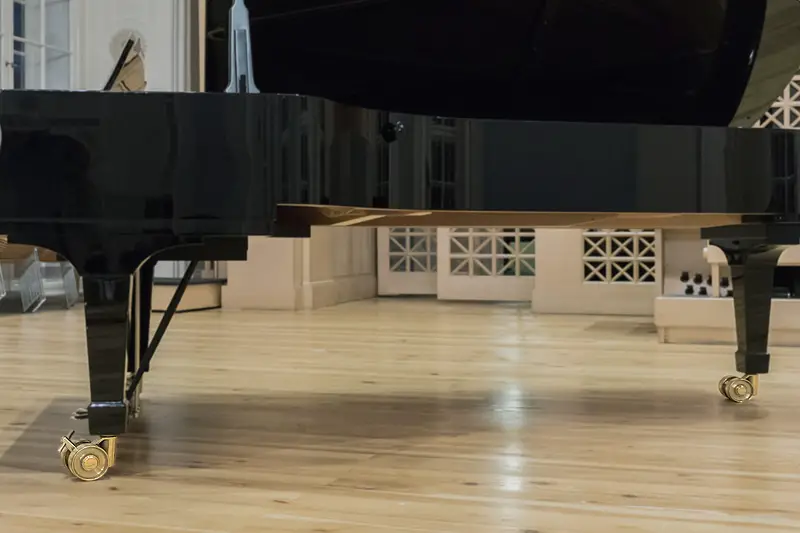If you want your piano to look and move at its best, polishing the wheels and casters is important. This is an easy and effective way to keep your piano in tip-top shape, both functionally and aesthetically.
Piano wheels and casters can be easily polished with standard metal polishes and a clean cloth. Specific polishes are recommended depending on the material of the wheels and casters. This routine cleaning and maintenance can be completed within a short period.
Piano wheels and casters are available in a variety of materials, so finding the right product to clean these components most efficiently is important. Below are step-by-step directions to polish your piano wheels and casters, as well as several recommended products for a variety of surfaces.
Materials Needed for Polishing Piano Wheels and Casters
Polishing your piano wheels and casters may seem like a daunting task, but it truly is a simple process with few required materials. Specific materials will vary based on the components of your wheels and casters, but in general, you will need:
- Metal polish
- Microfiber cleaning cloths or paper towels
- Painter’s Tape
The type of metal polish depends on your wheels or casters so I’ll cover that separately below. Polyurethane casters can be washed simply with soap and water.
Before Polishing Your Piano Wheels and Casters
 No matter the method chosen to polish your piano wheels and casters, it is important to protect the piano and surrounding areas from damage as you work.
No matter the method chosen to polish your piano wheels and casters, it is important to protect the piano and surrounding areas from damage as you work.
Many metal polishes are simple to use, but precautions must be taken to avoid costly and irreparable damage.
While useful, metal polishes can cause damage if not used properly. Possible trouble:
- They may leave unsightly residue or blemishes on wood surfaces, such as your floors
- They may strip the existing varnish from your piano
- They may cause discoloration to your clothing or surrounding non-metal surfaces
This can be avoided by taking measures to protect surrounding surfaces, such as:
- Taping off adjacent non-metal components with painter’s tape
- Rolling the piano over a plastic floor or carpet protector
- Rolling the piano to an easily accessible nearby area (garage, hardwood floor instead of carpet, etc.)
- Utilizing small tools such as cotton swabs to reach small crevices rather than spraying or applying polishes over a wide area
Best Method for Polishing Piano Wheels and Casters
The actual physical process of polishing your piano wheels and casters is quite simple. Below are the steps to take to complete this task.
- Tape off or cover surrounding materials to avoid getting metal polish on non-metal surfaces.
- Shake the bottle well to mix the metal polish.
- Place a small amount of the polish on the towel or microfiber cloth.
- Gently rub the polish onto the metal surface with smooth, circular motions. (On heavily tarnished areas, you can also dab the polish and let it sit for a few minutes before rubbing. You’ll want to check your specific polish for directions.)
- Utilize a cotton swab dipped in polish to reach small areas.
- Fold the towel over to a clean section and finish buffing the metal.
- Use a dry cotton swab to buff leftover polish in the small areas.
After you’ve completed these steps, make sure to wash your hands thoroughly to remove any cleaner residue. Also, make sure to dispose of the cleaner and soiled cloths properly since the polish may be harmful to pets or other surfaces.
Cleaning Products for Your Piano Wheels and Casters
Piano casters and wheels are made from a variety of different materials, and are an important, load bearing, functional piece of your piano.
The material that your wheels and casters are made of will dictate the specific recommended cleaning strategy. Most commonly, piano casters and wheels are made of the following materials:
- Brass
- Cast Iron
- Nickel
- Stainless Steel
- Polyurethane
No matter the material, a thorough and complete polishing will keep your piano pieces shining brightly.
Casters are most often metal because these materials can withstand a high amount of pressure and weight. Unfortunately, metals also tarnish quickly and can become dull and dingy without routine upkeep. A quick polish will have these pieces shimmering like new.
Products for Cleaning Brass Casters and Wheels
 Brass is a common material used for casters and wheels. It has a shiny, aesthetically pleasing surface, but this surface is prone to tarnish and weathering. Brasso is a common and professionally used brass polish that won’t break the bank. It requires a soft cloth or sponge, and there is no need to rinse afterwards.
Brass is a common material used for casters and wheels. It has a shiny, aesthetically pleasing surface, but this surface is prone to tarnish and weathering. Brasso is a common and professionally used brass polish that won’t break the bank. It requires a soft cloth or sponge, and there is no need to rinse afterwards.
Products for Cleaning Cast Iron Casters and Wheels

Cast iron is an extremely strong and durable material, but it is prone to unsightly rust spots and buildup. There are several easy options for removing the rust from your cast iron casters and wheels.
- Evapo-Rust needs to sit on the surface (use a soaked paper towel) for 15-20 minutes before buffing.
- Remove the rust by scrubbing with a fine steel-wool or another form of scouring pad.
Products for Cleaning Nickel Casters and Wheels

Nickel-plated casters and wheels are popular for their shine. Nickel is also prone to tarnish and can appear grimy and drab without sufficient polishing. Flitz is a popular and professionally recommended cleaner for nickel-plated components of your piano.
Note: It is important not to let Flitz dry on the surface, instead begin buffing with a dry cloth as soon as you apply it to your pieces.
Products for Cleaning Stainless Steel Casters and Wheels
Stainless steel polishes are widely available due to the popularity of stainless steel appliances, and a general cleaner such as Sprayaway will do the trick.
In the case of aerosol sprays, spray the cleaner directly onto your microfiber cloth and then buff the metal surface.
Products for Cleaning Polyurethane Casters and Wheels
Polyurethane casters are popular due to being softer than metal casters on hardwood or other flooring surfaces. Polyurethane is simple to clean and can be buffed, cleaned, and polished with a simple mix of warm, soapy water and then dried with a clean, soft cloth.
Continued Maintenance or Replacement of Piano Wheels and Casters

If your wheels and casters are too severely damaged to simply polish and clean, replacement casters may be necessary. This can occur if:
- Casters and wheels have rusted away and are thin or cracked
- Wheel material has cracked
- Joints or sockets are damaged or bent
In these cases, if a professional repairman is unavailable or you are simply choosing to DIY it, there are several important steps to take.
The piano must be situated properly in order to reach the existing wheels and casters for replacement.
For an upright, the piano must be gently placed on its back, so all four legs are in the air and accessible. Do not place the piano on its side, as this can be dangerous if it tips over.
A grand piano should be lifted no more than two inches off the floor, and the casters and wheels replaced one at a time. Grand pianos can be placed on sawhorses or similarly designed, sturdy surfaces.
Pianos are heavy, and we urge caution when moving or rotating them. It is never a one-person job but should be attempted by several grown adults observing safety measures.
Importance of Routine Piano Care
A piano is an important investment, and when routine maintenance measures are taken, it can last several lifetimes and become an important familial focal point.
Whether your piano is a pre-owned, well-used practice piece for your kids, or a beloved family heirloom, keeping it neat and tidy will only enhance its longevity.
From top to bottom, pianos require care and upkeep. Don’t let the idea of cleaning and polishing your wheels and casters intimidate you. There are many resources available, and hopefully, this article has increased your confidence.
Recommended Cleaning Supplies
For your convenience, we included product links within the text above as they are relevant. If you’re looking for more supplies, check out our recommended piano supplies and accessories page.
Pro tip: Piano caster cups will save your hardwood floor!


